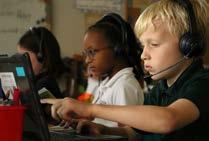
4 minute read
Wired for Learning
Classroom technology once meant pulling up a chair to the beige computer tucked away in the corner of the room, inserting a floppy disk, and playing “The Oregon Trail.”
That’s a far cry from today’s classroom experience.
“It’s ubiquitous,” Head of Lower School Sarah Barton Thomas said of school technology, from Kindergarteners learning to use an iPad to 8th Grade students on Chromebooks contacting legislators before their class trip to Washington, D.C.
The presence of technology in the classroom, Thomas said, is a sign of its role in society and life in general. “Technology - laptops, tablets, the internet - is something that students will have never lived without,” she said.
That’s evident in the skills that students bring with them to school, said Lower School Digital Learning Catalyst Mer Leeson.
“There are some 8th Graders who have been coding and working in JavaScript,” Leeson said. Kindergarteners know how to take photos on a phone.
With more students already adept at using technology, Assistant Head of School for Academics Stephanie Griffin said Trinity’s role is “to teach students how to see technology as a learning tool, not just a toy.”
“We want students to create, not just consume information, and to be engaging with the world around them,” Griffin said.
Building Blocks of Technology Use
The rollout of technology is different for each grade, but each stage is built on the foundation of learning digital citizenship - how to use technology responsibly and respectfully.
“We value being a good part of the community, so translating that into when we’re online,” Leeson said. The school year begins in grades 1-5 with Leeson teaching citizenship and creative expression and how technology can help students show “the wonderful uniqueness that’s all about who you are.”
Kindergarten is unique in that their access to technology begins in the second trimester. “That’s intentional,” Griffin said, “because we believe that students need to first have a strong foundation in their classroom and the relationships they develop with each other and their teachers.”
Embedded within digital citizenship lessons is learning how to balance technology use. “We want to set up children to be comfortable with technology, know how to use it, and have conversations about why it’s important to put it down and go outside and play or read a book,” Leeson said.
As the school year progresses, grades 1-5 study coding, robotics, engineering through an iterative design process, and video production. The type of technology progresses through the grades: K-2 students work on iPads, and 3rd Grade students transition to Chromebooks, taking them home one night every other week. Their use of Chromebooks expands as they reach 5th Grade and then enter Middle School.
A.I. Enters the Chat
A “technophile at heart” since she was a teenager, Trinity’s IT Director, Teresa Barrow, has been amazed at the evolutions she has seen and continues to be excited about its potential - including in the area of artificial intelligence (A.I.).
“When it’s used properly, A.I. can be a great learning tool,” she said, from helping fine-tune a lesson plan for a student with a learning difference, to helping overcome writer’s block. “I’m cautiously optimistic.”
Like with other technology, Barrow said it’s important to embrace A.I. rather than ignore it in order “to prepare students for what’s coming.”
"I want to see future engineers come out of Trinity, " she said. "As bright as our children are, I want to see them be great adults, and I really hope technology will get them to that point."
Leeson said teaching about A.I. not only provides a strong foundation for students in their future workforce, but can also benefit them in the development of research skills as they learn to refine their input and become better at deciphering quality of information.
“You have to use the tool and know it to be able to improve the tool,” they said, adding that it’s a new layer of the digital citizenship expectations of students’ technology use. “When you’re teaching the tools, you teach responsibility.”
Griffin said Trinity is “really thoughtful in how we take our next steps” with A.I, “but what is abundantly clear is that the landscape of school education and students’ lives are going to be deeply impacted by technology and artificial intelligence.”
“The more I learn about it, the more I’m fascinated,” she said. “There are so many applications in the school realm, and I am eager to explore that.”


